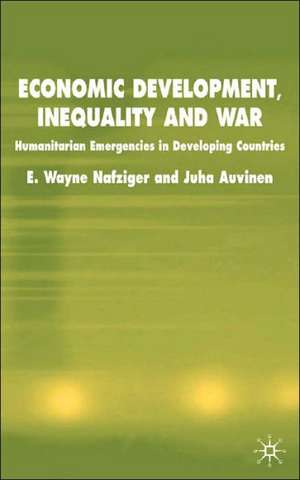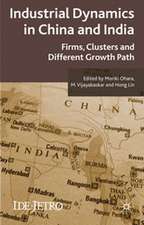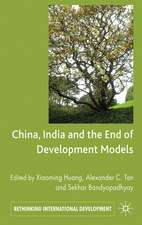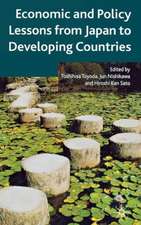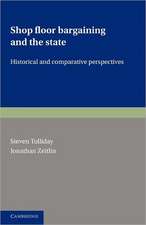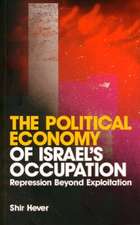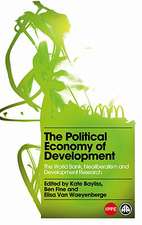Economic Development, Inequality and War: Humanitarian Emergencies in Developing Countries
Autor E. Nafziger, J. Auvinenen Limba Engleză Hardback – 16 sep 2003
| Toate formatele și edițiile | Preț | Express |
|---|---|---|
| Paperback (1) | 637.28 lei 6-8 săpt. | |
| Palgrave Macmillan UK – 2003 | 637.28 lei 6-8 săpt. | |
| Hardback (1) | 640.88 lei 6-8 săpt. | |
| Palgrave Macmillan UK – 16 sep 2003 | 640.88 lei 6-8 săpt. |
Preț: 640.88 lei
Preț vechi: 753.97 lei
-15% Nou
Puncte Express: 961
Preț estimativ în valută:
122.67€ • 133.29$ • 103.11£
122.67€ • 133.29$ • 103.11£
Carte tipărită la comandă
Livrare economică 21 aprilie-05 mai
Preluare comenzi: 021 569.72.76
Specificații
ISBN-13: 9781403917973
ISBN-10: 1403917973
Pagini: 260
Ilustrații: XI, 244 p.
Dimensiuni: 140 x 216 x 19 mm
Greutate: 0.43 kg
Ediția:2003
Editura: Palgrave Macmillan UK
Colecția Palgrave Macmillan
Locul publicării:London, United Kingdom
ISBN-10: 1403917973
Pagini: 260
Ilustrații: XI, 244 p.
Dimensiuni: 140 x 216 x 19 mm
Greutate: 0.43 kg
Ediția:2003
Editura: Palgrave Macmillan UK
Colecția Palgrave Macmillan
Locul publicării:London, United Kingdom
Cuprins
A Humanitarian Emergency: War, Genocide, and Displacement Poverty, Stagnation, Unemployment, and Inflation Ethnicity, Political Economy, and Conflict Inequality, Exclusivity, and Relative Deprivation Stagnation, Inequality, Adjustment, and Elite Interests Authoritarianism, Democratization, and Military Centrality The Failure of Agriculture: Food Entitlements, Elite Violence, and Famines The Conflict over Land and Natural Resources Preventing Humanitarian Emergencies: Policy Implications
Recenzii
'We need a clear understanding of what causes humanitarian emergencies if we are to have any chance of taking preventive action. In this new book Wayne Nafziger and Juha Auvinen give us a concise and authoritative view of what to look out for when trying to understand the complex causes of war and humanitarian emergency, in particular the often neglected role of social inequality and relative deprivation.' - Tony Addison, Deputy Director World Institute for Development Economics Research (UNU/WIDER)
E. Wayne Nafziger and Juha Auvinen have produced a powerful, timely, and exceedingly well-researched analysis of the relationship between economic development and conflict and how economic factors affect war and state violence. This book makes a significant and highly commendable contribution to the literature on the economics of conflict and war, especially as they relate to human tragedies in developing nations. Easily the most authoritative source on the development implications of conflict and human catastrophe, this book provides comprehensive and multidimensional examination of the major sources and consequences of conflict - from the role of poverty, inequality, unemployment, and inflation to the impact of economic adjustment, authoritarianism and democratization. Most importantly, the book suggests pointed policy recommendations that would prevent further humanitarian emergencies in the developing world. - Emmanuel Nnadozie, Truman State University
Nafziger and Auvinen make a strong case for partially rejecting the currently fashionable analysis among some agencies such as the World Bank that individual greed is at the root of internal conflicts. They argue that grievances, especially popular anger over inequality, are closely associated with the appearance of humanitarian emergencies and internal wars. The cause of this problem is found in the behavior of small groups of elites who hang onto power. In many contexts rulers best do this through policies that are economically destructive and tear down the institutions of their own states-an abject and consciously engineered failure of economic development. Societal reactions to these strategies generate grievances, and ultimately conflicts. These reactions cannot be separated from material interests, but they are not the same thing as greed since popular demands originate in norms of entitlement. The authors explain how the context of local elite political choices, usually great poverty and preexisting social divisions, plays a crucial role in shaping how avaricious rulers promote their interests and how others react.
This very important book brings international policy to the heart of the analysis of humanitarian emergencies and conflict. The authors show how multilateral creditor policies that aim to cut the size of the state amidst shrinking resources reinforce the socially damaging behavior of some elites. They convincingly argue that concerted re-examination of global norms and policies on debt, arms trading, and diplomatic support for seemingly stable authoritarian regimes thus would make a significant contribution to remedying the root causes of internal conflicts.
Economic Development, Inequality, and War fills a void in the scholarly literature on humanitarian emergencies and conflict, and hence challenges assumptions of policy makers charged with addressing these emergencies. This book offers a comprehensive, rich, and insightful explanation of the root causes of internal conflicts. The fact that the authors are among the best-known experts on this subject will guarantee this book a wide audience among advanced undergraduate and graduate students, and policy and academic specialists.' - William Reno, Department of Political Science, Northwestern University
'This excellent volume provides a concise analysis of the root causes of humanitarian emergencies...The authors make an important contribution to the literature while providing us with a primer on the root causes of deadly conflicts.' - Basel Saleh, Journal of Peace Research
E. Wayne Nafziger and Juha Auvinen have produced a powerful, timely, and exceedingly well-researched analysis of the relationship between economic development and conflict and how economic factors affect war and state violence. This book makes a significant and highly commendable contribution to the literature on the economics of conflict and war, especially as they relate to human tragedies in developing nations. Easily the most authoritative source on the development implications of conflict and human catastrophe, this book provides comprehensive and multidimensional examination of the major sources and consequences of conflict - from the role of poverty, inequality, unemployment, and inflation to the impact of economic adjustment, authoritarianism and democratization. Most importantly, the book suggests pointed policy recommendations that would prevent further humanitarian emergencies in the developing world. - Emmanuel Nnadozie, Truman State University
Nafziger and Auvinen make a strong case for partially rejecting the currently fashionable analysis among some agencies such as the World Bank that individual greed is at the root of internal conflicts. They argue that grievances, especially popular anger over inequality, are closely associated with the appearance of humanitarian emergencies and internal wars. The cause of this problem is found in the behavior of small groups of elites who hang onto power. In many contexts rulers best do this through policies that are economically destructive and tear down the institutions of their own states-an abject and consciously engineered failure of economic development. Societal reactions to these strategies generate grievances, and ultimately conflicts. These reactions cannot be separated from material interests, but they are not the same thing as greed since popular demands originate in norms of entitlement. The authors explain how the context of local elite political choices, usually great poverty and preexisting social divisions, plays a crucial role in shaping how avaricious rulers promote their interests and how others react.
This very important book brings international policy to the heart of the analysis of humanitarian emergencies and conflict. The authors show how multilateral creditor policies that aim to cut the size of the state amidst shrinking resources reinforce the socially damaging behavior of some elites. They convincingly argue that concerted re-examination of global norms and policies on debt, arms trading, and diplomatic support for seemingly stable authoritarian regimes thus would make a significant contribution to remedying the root causes of internal conflicts.
Economic Development, Inequality, and War fills a void in the scholarly literature on humanitarian emergencies and conflict, and hence challenges assumptions of policy makers charged with addressing these emergencies. This book offers a comprehensive, rich, and insightful explanation of the root causes of internal conflicts. The fact that the authors are among the best-known experts on this subject will guarantee this book a wide audience among advanced undergraduate and graduate students, and policy and academic specialists.' - William Reno, Department of Political Science, Northwestern University
'This excellent volume provides a concise analysis of the root causes of humanitarian emergencies...The authors make an important contribution to the literature while providing us with a primer on the root causes of deadly conflicts.' - Basel Saleh, Journal of Peace Research
Notă biografică
E. WAYNE NAFZIGER is Distinguished Professor at Kansas State University, is co-editor of War, Hunger, and Displacement and The Prevention of Humanitarian Emergencies; author of numerous books and articles on development economics; and was researcher at the UN University's World Institute for Development Economics Research, the Carter Center, the East-West Center, and in Nigeria, India, Japan, and Britain.
JUHA AUVINEN is Docent of International Politics at the University of Helsinki, is author of articles on conflict and security in several journals, including Third World Quarterly, Journal of Peace Research, Journal of Conflict Resolution and World Development. He is working in the European Commission, Brussels, in charge of the design and management of Joint Actions in the field of Common Foreign and Security Policy (CFSP) of the European Union.
JUHA AUVINEN is Docent of International Politics at the University of Helsinki, is author of articles on conflict and security in several journals, including Third World Quarterly, Journal of Peace Research, Journal of Conflict Resolution and World Development. He is working in the European Commission, Brussels, in charge of the design and management of Joint Actions in the field of Common Foreign and Security Policy (CFSP) of the European Union.
